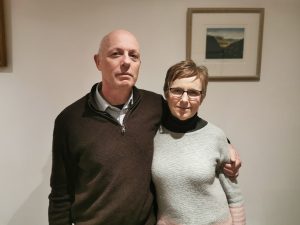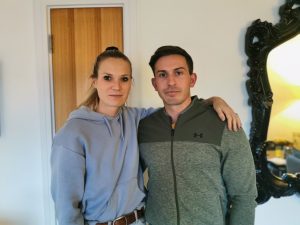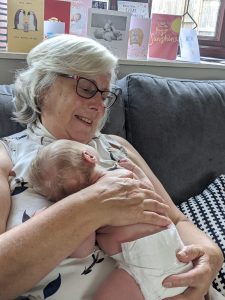Katie and Jim

Jim and Katie downsized to their flat in Birmingham a number of years ago. They used the money they made from their previous house sale, to support one of their sons move into the same building.
Now they are faced with trying to find crippling service charge fees to fund waking watches, and remove and replace cladding on their building. Jim and Katie are unable to earn their way out of this crisis. In addition, their son is also not able to meet the service charge demands expected over the next 12 – 18 months.
Katie says, “We worked all our life to make sure we had a safety net if we needed it, such as if we need long term care as we get older. Now we’ve had the rug pulled from under our feet. We don’t know if we can help our children or our parents if they need it. We don’t know if we will be able to cope ourselves.”
Jim adds, “We wanted to know we could support our 3 sons with their families, when they have weddings, and if they have children. We have been very careful in our lifetimes to do the right thing, and not to throw money away on trivial things. To save for the future. Now we all face an uncertain future”.
Patrick and Laura

Patrick is a first time buyer who put his life savings into buying his leasehold property, and had started saving to make renovations to the flat.
He recently found out the extent of the costs for cladding and fire safety repair works for his building, he states, “The current estimations for the repair bills they expect me to fund are close to double my annual salary”.
Patrick bought the flat 18 months after finishing university, after getting a job in the NHS. His girlfriend, Laura, has just moved in and they were planning on starting their life together, and now they face putting their life on hold for the foreseeable future.
Patrick says, “This issue is seriously affecting my mental health, it’s permeating every part of our lives. We can’t stop thinking about how we are going to cope”.
Alice

Alice purchased her property less than 2 years ago as a first time buyer. She used the bulk of her savings for the deposit. The rest has been wiped out by her rising service charge, increased to cover interim fire safety measures for her building, she states “I have no savings to fall back on now”.
Alice is funding her property on a single, graduate-level, salary. She has now been advised a further £40,000 will be required to make her flat safe, and repair cladding and fire safety issues. Alice continues, “There are limited loan options available to me. The monthly repayments are barely affordable and the interest would run into the tens of thousands. I am nervous to approach my mortgage lender due to the ongoing insurance issues with the building”.
Alice’s parents have offered to dip into their life-savings, Alice states “This is becoming a burden on them as much as it is me and I feel so guilty. I am starting to question what kind of future I will have. Will I be able to afford to buy a long-term house, get married, or have children?”
“I don't feel I am enjoying my life right now as any other 20-something-year-old would be. I am now watching every penny. I feel guilty whenever I spend money. Money is being demanded from us, but I feel we have little say in the costs and there is no certainty when the works will even take place. We have to put our faith in our managing agents. I don't feel like a proud home owner anymore. I would have been better off renting for the next 10 years.”
Sophie and Phil

Sophie and Phil discovered they had a potentially serious issue with their flat in Birmingham, when they tried to sell it last year and the sale fell through.
Phil 34: “At that time one of the reasons given was the increased service charge. We knew that our building had been carrying out fire safety checks, but had assumed that the service charge would return to normal when complete”.
Sophie, 32: “A few months later I attended our leaseholder meeting and realised the full extent of the situation. At that meeting we were told our building required repairs costing up to £8 million pounds, tens of thousands per leaseholder”.
Now Sophie and Phil have had to put their plans to start a family on hold, as they can’t currently sell their flat to move to a family home. They are also struggling to work out how they will fund the works, as they cannot currently re-mortgage their property to raise the funds.
Rachael and Andy

Rachael and Andy purchased their flat as a shared ownership property back in 2008. They saved and were able to purchase the other 50% about 6 years later Rachael states, “As we’re getting a bit older, we really wanted to move out of the city centre to a quieter area. We put our flat on the market in April 2019. We received an offer quickly, but then our buyer pulled out as the lender was not satisfied with the information we could give them on the external structure of the building.”
Andy continued, “In the meantime we'd found and put an offer in for our dream home, so when the fall through happened that was quite devastating.”
They put our flat back on the market and received another offer. The seller of their dream home held out for months. Again they were asked to provide more detail on the cladding make up and the installation. They pushed for a survey of the cladding. The report made a number of recommendations to improve the fire safety including replacing cladding.
Rachael says, “Our buyer wasn't willing to wait any longer and so pulled out early January 2020. And the seller of the house we wanted to buy unsurprisingly accepted another offer.Andy says, “Now our flat is valued at £0. We are trapped. And increasing repair costs will hit us to remedy any of the issues. We still don’t know how much that will be but we will have costs for further surveys, new fire alarms, and a waking watch, alongside cladding works. We cannot look forward to the next stage in our lives.”
Jenny

Jenny is a first time buyer who moved into her flat in February 2019. She states, “I waited and saved for a long time for my flat. I know I’m lucky to be able to afford a home, many people can’t. But I am devastated. I can’t see how people are going to be able to pay these bills.”
In March, Jenny received her first service charge demand for Jan – Jun 2020 for £7,385, she continues, “I knew a big bill was coming, but it was still much worse than I thought. Our building should qualify for the new building safety fund, but no one ones when or how that will be paid. In the meantime our building insurers are continuing to threaten to pull our insurance if we don’t start removing cladding this year. It’s a nightmare situation.”
Jenny’s flat, which was worth £160K when she bought it, is now unsellable. She can’t secure a loan against it, and fears what will happen in the future. “I spoke to a few people and they said I would still be liable for these bills, even if I can’t pay them. I could be bankrupt and face trying to restart my life in a number of years’ time when I am nearly 50. I don’t know what to do.”
Brian

Brian and Mark bought their apartment in Islington Gates in 2006. It was the second last in the development to be sold. They loved the Jewellery Quarter and the location of Islington Gates. Brian volunteered to be a member of the management committee. He has helped to manage the development for the last 15 years.
Sadly Mark, Brian’s husband and sole-mate of 30 years, passed away just over a year ago from a rare sarcoma cancer. Brian is now living alone on a pension. He has estimated that he will need to find nearly £100,000 to meet the obligations of his lease. He is going to have to use his life savings and pension pot to insure he doesn’t lose his home.
Brian says, "I worry about the life changing impact this situation is having to other leaseholders, especially the young people whose lives are being put on hold."
He also loses sleep about the responsibility of being a member of the management committee and his duty to look after the leaseholders best interest. His position has taken a toll on both is physical and mental health.
Tracey and Julien
Tracey and Julien have lived in their apartment since it was built. Tracey says, “We watched it being built, in fact Julian appeared in an article in the Evening Mail promoting city living at the start of the build. He was almost a ‘poster boy’ for the development.”
Julien suffers from some complex medical issues including leukaemia, diabetes and a recent severe stroke. Tracey continues, “We have faced many issues, but he has battled on, and got back to work with support. He is now working from home because of COVID-19.”
Tracey owns and runs a salon in Bearwood, which was established in 1991, “I employ 3 staff and have associated practitioners on site. With the current crisis, I have taken the decision to close the salon for the first time in 29 years. The advice from NHS and Government have made staying open very irresponsible. It is very stressful, as I have the responsibility to my staff and clients. We don’t know what will happen in the longer term.”
“On top of all of that we now have this issue of cladding. It feels like we are helpless, despite the money offered by the government in the last budget.” Tracey and Julien feel there are many questions unanswered. Tracey asks, “Who is responsible for substandard fire safety installations? Why are our insurers placing unfeasible timescales on repairs, and making us pay 5 times what we paid before? Why are we being held responsible for building materials and processes that were signed off by building regulators and the NHBC? What is the Freeholder doing?”
Wine

Wine moved to Birmingham in 2011 to do a PhD and bought her flat in 2016. Having moved around a lot with her job in previous years she was excited about her first home.
Wine states, “Over time, my partner moved in with me, and we have loved every minute of living in this flat.
We are both academics on short, fixed-term contracts, which forces us to live where the jobs are. I always knew it would be difficult to continue living in my flat long-term because of our career choices. Last year, I was awarded a research fellowship in Dublin. So in the last few months I have rented a room in Dublin, coming back to visit with my partner in the flat as much as I can. It is my home.”
Now, Wine’s partner's work contract is finishing in Birmingham, and his next role is in Belgium, where he will move in June.
Wine says, “Even before the cladding crisis, our situation was complicated, with lots of travel and compromise. We agreed I would move to Belgium once my contract in Dublin finishes, and we would start a new life there together. We were thinking of buying a property in Belgium, and to do that I would want to sell my flat in Birmingham.”
“Now, with the cladding issues, I don't know what will happen. I worry I will not be able to pay the cladding bills. I worry I will not be able to sell, or even rent out, my flat. I’m lucky my partner is understanding, but I worry I might lose my home altogether and end up bankrupt.”
Harry

Harry lives in a 15 story council building where he bought his flat after finishing University. He also made sacrifices to save and buy a second property in the building as an investment. He is one of only 5 leaseholders in the 1960’s tower block - the rest are flats owned by the Birmingham City Council.
He says, “On Friday 13th September 2019, I received a notice of intention letter for works on the building I live in. I thought it was a mistake actually, as it was so much money. I had no prior warning of these works, and have received two letters for £16,500 each for my share of the costs - with the possibility this might increase on completion. This money is on top of the standard service charge bill of around £1,300 a year. It seemed the works were planned long before I received the letters, as the constructors started preparing the site as early as June 2019.”
Harry is a small business owner, running his company from his home. His ability to work has been impacted by the noise from the works. As with many self-employed, his income fluctuates, and he often earns less than minimum wage.
He continues, “It’s had a significant impact on my mental health. I can’t get hold of anyone in charge of these works. I’ve been passed around from department to department. The explanation of the costs has been confusing. The first said it was for repairs to the roof. The second mentions thermal upgrade of cladding. I know our cladding is not the same as used in Grenfell Tower, but I need to understand if our building could qualify for support with the new building safety fund.”
Since receiving the initial letter, Harry spent 6 months, and over 20 emails and phone calls, and has yet to be able to talk to someone who can answer his queries, Harry says “Obviously I don't know how I'm going to pay these bills. Not many people have this kind of money lying around.”
Tom

Tom is a 38 year old, hardworking professional who has studied and lived in Birmingham for 15 years. He is also a volunteer director for his building.
He recently found out that his building no longer meets fire safety regulations; the insulating material needs to be replaced.
Tom states, “This is a desperate situation, not only am I concerned for myself but I’m thinking of the hundreds of families in our building, who risk have their lives ruined.”
“Our current situation is very serious, insurers have advised we need to find +£500,000 for just one year’s insurance by 1st May; we just don’t have the cash available. The onward consequences of this could be dire; it could put into jeopardy the future plans for so many leaseholders. In the worst case, it could see homes repossessed all at a time when the fire safety at the building is the best it has ever been due to improvements we have funded. The local fire service has visited and have clear plans to help in the event of a fire occurring, they even have individual plans for vulnerable residents. Multiple engines and large crews would be here within minutes.”
Sadly, this is potentially just the start of a long battle for Tom and the residents in his building, he continues, “The immediate pressure is the insurance. Even if we somehow manage to sort this out, as it stands we will likely need to re-clad and insulate the entire building to meet the terms of our insurance. This will cost millions of pounds, and the building safety fund announced by government will be both too small to cover all blocks and too restrictive in its terms for us to qualify. If the government bodies do not step in, we risk hundreds of people being made homeless and/or bankrupt. All of this collides with COVID-19. Many of our residents have reduced income at this time which only adds to the pressure of this news.”
Antonio

Antonio moved to the UK in 2015, after finishing his PhD in Computer Science in Spain, to continue his research and teaching.
In 2016, he moved to Birmingham to take on a lecturer post, and, having saved for a few years, bought a flat in the city centre in 2019. The dream was to walk to work, and despite the long purchase process, he was happy with his decision when he moved into the flat last summer.
Antonio states, “All the reports and surveys I commissioned said the flat was fine, and that the building was safe as well. The building had been renovated in 2007, with no issues found in the 12 years since then, so it seemed like a good choice. I was happy to have my own place where I could change things as I saw fit.”
Now Antonio has found that his building is not safe; that the buildings insurance has multiplied by an order of magnitude; and that the leaseholders who live there need to collectively find millions of pounds to fix cladding and fire safety issues in a matter of months.
Antonio continues, “I did not expect to be put in this situation from through no fault of my own, because of a change in building regulations. I have always been responsible with my finances, and while I, thankfully, do not have any dependents, I am very worried that I may lose my home and my hard-earned savings in an instant.”
Antonio’s family all live in Spain, “I do not have other place to live in the UK than my flat in Birmingham. The COVID-19 situation is already stressful enough - worrying about my family and students. On top of that I have this lingering worry at all hours about not having a roof over my head. The anxiety is making it very difficult to focus on my work and support my students.”
Vickie

Vickie bought her Edgbaston flat in good faith from the developer in 2009. She
lives there with her husband and their 20-month-old son.
“Our apartment is on the market and we had hoped to be in our new family
home with a garden for our son by summer this year,” Vickie says. “We only
found out in January about the fire safety issues when our buyers couldn’t get a
mortgage on the property.”
The couple were shocked to discover that the cladding on their building was a potential fire hazard and that their home was unmortgageable. “We can’t sell and, as a result, we won’t be able to give our son a sibling as there isn’t the space in the apartment for the three of us as it is,” Vickie continues. “It has severely impacted our mental health and being locked down here 24/7 due to Covid has only worsened that.”
“If our campaign to have the remedial work funded is not successful, we are looking at losing all our savings – and then some – and we won’t be able to afford to move anyway. We are angry and stressed but highly motivated to find a solution to ensure the financial burden does not fall on the shoulders of leaseholders like us, who are not at fault.”
Susan

Susan is stuck 65 miles away from her first grandchild, a little girl born in July 2020. Now retired, Susan has worked as CEO in community-based charities in Birmingham, East London and Wolverhampton. After the family home was sold, Susan was delighted to buy a ground-floor apartment in Edgbaston. For ten years she enjoyed the convenience of a modern apartment, loving the design of the block and its location.
In December 2019, when Susan learned that her first grandchild was expected, she began to make plans to sell her apartment and move closer to her son and daughter-in-law. Her plans came to an abrupt halt earlier this year.
The first setback was the news that an EWS1 form would be required for prospective purchasers. The Resident Management Company and the managing agents quickly organised a Fire Risk Assessment, which Susan assumed was just a formality – a box-ticking exercise to satisfy lenders.
“It was a major shock when the Fire Assessment EWS1 form came back with ‘an adequate standard of safety is not achieved’ and ‘remedial and interim measures like Waking Watch required,’” Susan says. “It had never occurred to me that this beautifully designed block was potentially unsafe for the people living here.”
“It was a major shock when the Fire Assessment EWS1 form came back with ‘an adequate standard of safety is not achieved’ and ‘remedial and interim measures like Waking Watch required,’” Susan says. “It had never occurred to me that this beautifully designed block was potentially unsafe for the people living here.”
Susan now faces the prospect that, even assuming the remedial works can be undertaken and funded, it could be a year or more before she can move closer to her granddaughter.
Tom

Prior to moving to Edgbaston, Tom lived with his mother in their family home
in Walsall. Sadly, his mother died in 2014, leaving Tom with the house.
Tom sold the family home in 2016 and purchased his Edgbaston flat in a development near the places where some of his happiest childhood memories had been formed – Cannon Hill Park, Edgbaston Cricket Ground and the MAC.
“The flat signified a new start for me,” Tom says, “A place to finish my PhD at the University of Birmingham and an opportunity to forge my own future, but to do so in an area with strong links to my past, and to my mum. It also seemed to be a sound investment, based on the professional advice
available to me.”
Tom works full-time in an admin role at the University of Birmingham, which gives him the time and energy to work on his PhD and to teach on the odd undergraduate module. The job, however, does not give him much in the way of disposable income. A substantial increase in the service charge costs would serve to make living in his flat prohibitively expensive
for Tom.
“I’ve grown to love my little flat. Like the family home, it has become a place full of memories,” Tom continues. “But I am scared that, if the cladding costs fall on leaseholders, I will be trapped here, with rising bills and unable to sell. There is also the anxiety that comes with living in a building which has been deemed unsafe. Such fears are having an impact on my mental wellbeing – I have already taken days off work to cope with these stresses, and I expect many more sleepless nights in the months ahead.”
Joseph

Joseph was born and grew up in Edgbaston on a council estate in what is effectively Balsall Heath. He says, “I remember as a kid growing up in 70s Birmingham and giving my address at school – which because of the postcode was technically Edgbaston – and being told I lived somewhere posh! It didn’t feel posh, but I grew up knowing that Edgbaston was an
aspirational place.”
Many years later, Joseph achieved his 70s childhood dream and bought an apartment in Edgbaston. He and his wife, who works for the NHS, are raising their nine-year-old son there.
“I learned to walk in Cannon Hill Park, according to my mom, and watched
my own son take some of his first steps in that same park, so our apartment,
which is in a block next to it, represents so much more than just a place to
live for me."
Finding out earlier this year that the building might have a cladding issue that will result in exorbitant remediation bills – and that the apartment is now worthless as no one can get a mortgage to buy it – came as quite a shock.
But far more alarming for Joseph is the thought that he is living with his family in a building that is potentially a fire trap, and it’s not clear who, if anyone, can help. He may have no choice but to abandon his home in order
to protect his family.
Paula

Paula and her husband bought their Edgbaston flat in June 2018. They chose
their development because of its great location with many amenities and its
proximity to the university.
“We bought after the Grenfell tragedy and were conscious of safety, so we did
our due diligence,” Paula says. “I work from home and knew I’d be spending a lot
of time in the flat. We were given a 36-page fire / health and safety risk report that led us to believe – wrongly as it turns out – that the building was safe. There
was no possible way we could have known about the defects that have since
come to light.”
The couple are still making monthly mortgage payments on a flat that is currently valued at £0, and they are extremely worried about the possible financial burden to come.
“Leaseholders at our development have already incurred over £150,000 in costs for interim safety measures and legal fees,” Paula continues. “The Waking Watch alone is costing almost £5,000 per week until our new fire alarm system can be installed. We still have no idea what the actual
remedial work will cost, but based on similar cases around the UK, it’s likely to run into millions, which is terrifying.”
Stan

Stan has a deep personal connection with Edgbaston and Moseley having been to
Birmingham Medical School in the 70s and worked as a consultant surgeon at Dudley Road (City) Hospital until 2013. He lived in Moseley for many years and loved walking round Cannon Hill Park and the MAC.
When his late father’s flat in London was sold, Stan decided to invest the money locally by buying an apartment in an iconic building in a great position in Edgbaston. He and his wife go to great lengths to ensure that the flat is maintained
in tip-top condition with modern furniture.
They have been rewarded by having exceptional tenants, who love the place and value the amenity of the development. Two worked at University Hospital Birmingham for the armed services, and the current tenants are a professional couple with a young baby.
“We were shocked to learn of the defects in the building given its recent
construction and the high profile of the development and the builders,” Stan says. “We are extremely concerned for the safety of all the residents and are glad that the waking watch was arranged promptly and that a fire alarm is being installed.”
Stan is also concerned for those owner occupiers who may face the Catch-22 situation of being unable to afford the costs of remedial work on the building and also being unable to sell. “Many leaseholders face a far
bigger threat than I do,” he notes, “and it is vital that we manage to gain support from all relevant parties to obtain a remedy.”
Gwenael and Ibrahim

Gwenael and Ibrahim bought their flat as first-time buyers in 2018. It was a new chapter in their lives, and they hoped in time to start a family.
Only a month after their purchase, their service charge doubled. Having come to terms with that, they then found themselves caught up in the cladding scandal. Their flat is now unsellable, and they are in disbelief at being made liable for the costs of remediating a building they do not own.
“We are both foreigners,” says Ibrahim, “and no one in our respective families even understands our situation because it is all so far-fetched, so we have only each other to talk to. It all goes back to unscrupulous developers and an irresponsible and incompetent government suddenly pretending to care, not to mention the hefty bill we are expected to pay as a result.”
Even if overseas travel were possible, Gwenael and Ibrahim could not afford to visit their families in case the bills keep mounting. “Our mental health has never been so low and in continuous decline,” says Gwenael. “Like most people in our situation, we are in limbo - we simply cannot do anything with our lives except wake up, sit in front of a computer, exercise if we have the motivation (which we don’t), go for a walk, watch some TV, go to bed and start all over again the next day.”
Ibrahim adds: “We cannot allow ourselves to think of a holiday, a visit to see our families or even something as basic as a takeaway, in case we don’t have enough money to pay for a mistake that is not ours."
Robert
Robert (not his real name) bought his apartment in 2018 as a first-time buyer, having worked two jobs – a nine-to-five plus an evening shift – to get the deposit together. When he found an apartment in an established development close to the city centre, he believed he had made a safe choice.
Two years later, Robert finds himself desperately running out of options as he contemplates a financially ruinous cladding bill: “I can no longer see a path to any future I had planned, due to being stuck in the home I bought in good faith two years ago. This flat has gone from being my personal space, in which I was free to be myself, to a place I fear and despise.”
“If I am expected to foot the bill to remediate my development then it will break me, not only financially but mentally, and I will lose all motivation to get back into any sort of race again. I faced homelessness in 2014, and it took everything I had to get myself out of that situation. I really don't know if I have it in me to go through it all again.”
Robert has managed to keep this part of his history from his family and most of his friends. “I thought it was something I would never have to revisit,” he says. “But the cladding crisis has brought all my fears to the surface again.”
He adds: "I find particularly upsetting to read the news reports of lucrative contracts being awarded to developers and contractors linked to the cladding crisis.The Spending Review awarded the housing sector £20 billion of taxpayer money even though these same developers continue to build unsafe homes. I just don’t get it.”
